With the summer holidays fast approaching and many Spaniards likely to spend their holidays in their own country this year, competition for a good holiday let is starting to ramp up.
International tourists will start to arrive on Spanish shores soon, making it even more complicated to get a good deal.
A 2020 report by Spanish housing valuation company TecniTasa found that short-term apartment rentals for properties in coastal locations actually went up on average 3 percent last year compared to 2019, up to an average €750 a week. TecniTasa is yet to release this year’s valuation, but the group has already indicated that prices remain similar to 2020’s.
“Many families who own an apartment by the beach used to lease their property in July and August to obtain greater profitability,” president of TecniTasa José María Basañez said.
“Now they want to make the most of the summer, so they won’t let it out for weeks, reducing the offer of holiday lets on the coast.
“Families don’t mind paying a bit more and lengthening their stay either, in case there is a return of the virus, they can stay longer by teleworking from the beach.”
This uncertainty regarding the future is causing considerable volatility in the holiday rental market, although the general consensus is that prices will increase.
The following table shows a comparison of average weekly holiday rental prices across Spain’s different coastal regions, with the cheapest options in green on the right-hand column and the most expensive in red.
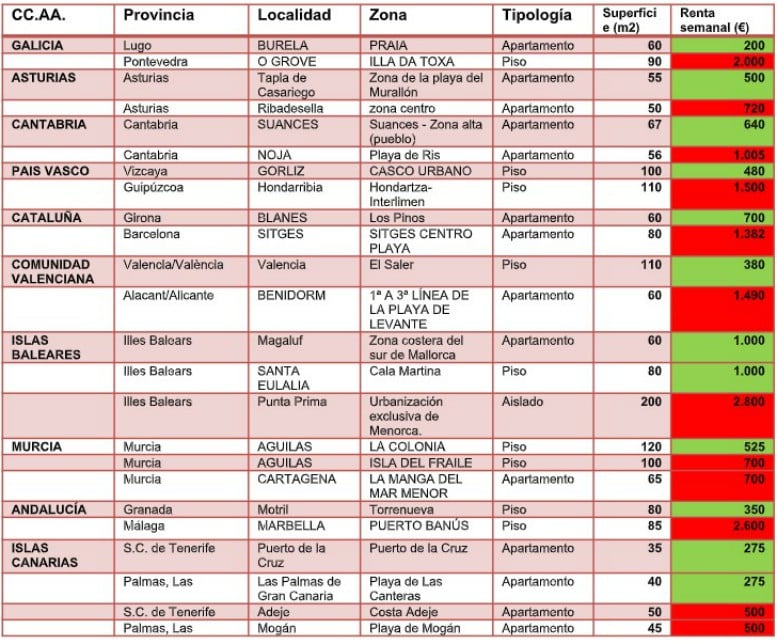
Andalusia
In Spain’s southern Andalusia region there are holiday rentals going for as much as €2,600/week in Puerto Banús in upmarket Marbella.
Two cheaper coastal options in the same region are Sotogrande (€ 1,500/week) or Puerto de Jérez (€ 1,300/week) but there are better deals in Motril (Granada), where an 80m2 apartment is going for €350 a week, or in Almería where it will cost €425.
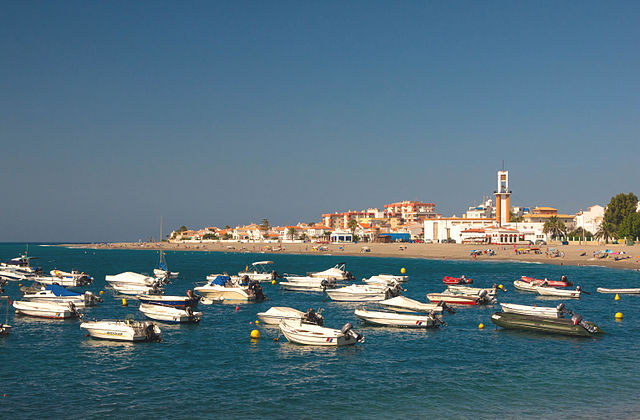 Calahonda beach in Motril. Photo: JebulonWikimedia
Calahonda beach in Motril. Photo: JebulonWikimedia
Spain’s northern coastline
Along Spain’s northern coast, prices are on average fairly high but there are some exceptions.
In Sanxenxo in Spain’s green region of Galicia a 100 m2 apartment on the beach in the coastal town of Portonovo costs an average €1,600 a week.
In classy San Sebastian in Spain’s Basque Country the weekly price reaches €1,375 for a 55 m2 apartment and in the little-known Basque town of Hondarribia the weekly bill for a 110 m2 place is €1,500.
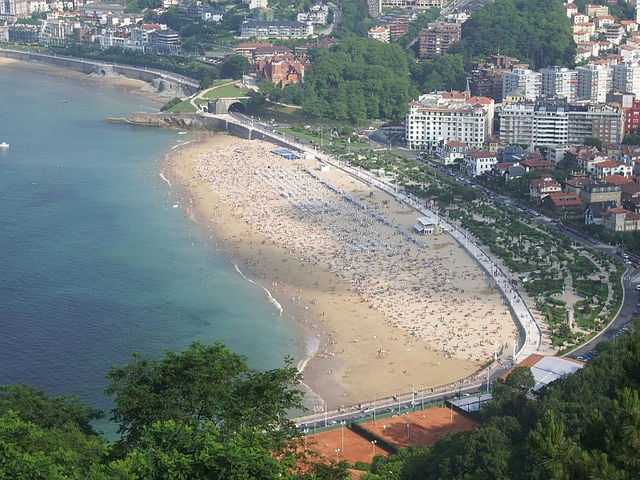 Ondarreta beach (San Sebastian). Photo:Josu Goñi Etxabe/Flickr
Ondarreta beach (San Sebastian). Photo:Josu Goñi Etxabe/Flickr
Some of the cheapest options along Spain’s northern coast are in the towns of Burela or Vicedo in Lugo province (Galicia), where’s it’s possible to find coastal holiday rentals for anywhere between €200 and €500 per week.
It’s a similar situation in Pontedeume near the Galician city of Coruña and in the picturesque town Tapia de Casariego in the neighbouring Asturias region.
Valencia region/Costa Blanca
Alicante has some of the most expensive coastal holiday rentals with prices of almost €1,500 in Benidorm’s Playa de Levante.
There are cheaper options available near El Saler beach not far from the region’s capital Valencia for around €380/week and in Moncofar (Castellón), where a beachfront apartment is going for €400.
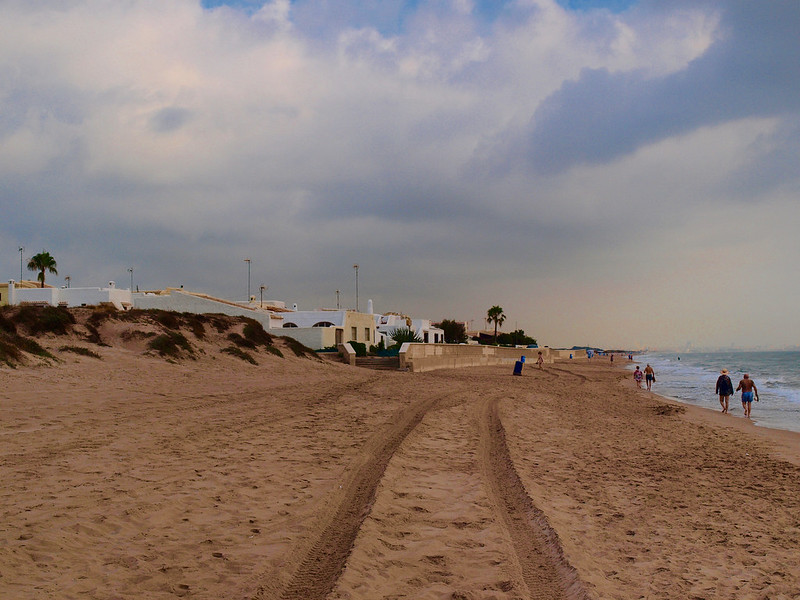 El Saler beach near Valencia. Photo: Rafał Próchniak/Flickr
El Saler beach near Valencia. Photo: Rafał Próchniak/Flickr
Catalonia/Costa Brava
The glitzy coastal town of Sitges near Barcelona has some of the most expensive holiday rentals in the region, with many properties costing just under €1,400 a week, and in Casteldefells there are holiday lets for less than €1,200 a week for a 75 m2 apartment.
A cheaper option in Catalonia is the town of Blanes, where 60m2 apartments are being rented out for €700 a week.
Balearic Islands
According to the report, the Balearic Islands are still one of the most expensive destinations in Spain for holiday lets, with prices of up to €2,800 for renting an apartment for a week in Punta Prima (Menorca), €2,200 in Puerto de Ibiza or €2,000 in Sa Rapita (Mallorca).
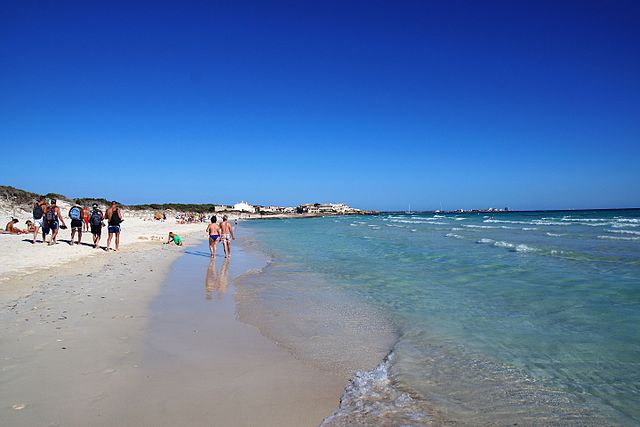 Beach in Sa Rapita in Mallorca. Photo: King Otto/Wikimedia
Beach in Sa Rapita in Mallorca. Photo: King Otto/Wikimedia
Canary Islands
One of the most affordable options for coastal holiday rents in Spain are the Canary Islands.
Both in Las Palmas de Gran Canaria in Playa de Las Canteras, and in Tenerife, in the town of El Puerto de la Cruz, you can get apartments for €275 a week.

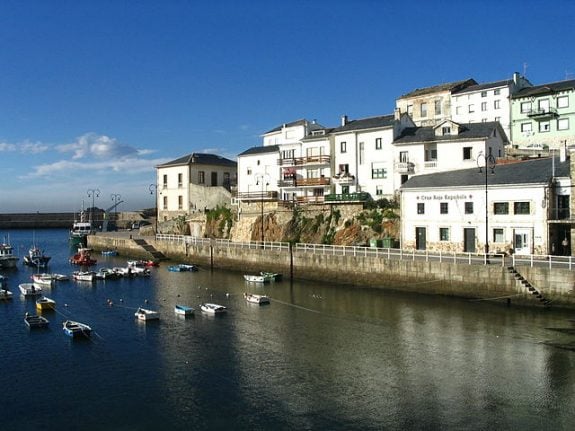

 Please whitelist us to continue reading.
Please whitelist us to continue reading.
Member comments